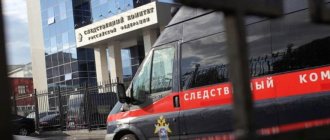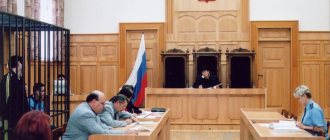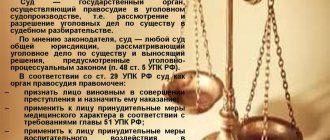Everything about criminal cases
Go to the text of the Code of Criminal Procedure
Url Additional information:
Prosecutor
- Part 1 37 Code of Criminal Procedure
two tasks: criminal prosecution and investigation supervision
I). Powers of the prosecutor during the investigation stage of the case
- Part 2 37 Code of Criminal Procedure
powers of the prosecutor at the stage of investigation of the case:
— clause 1 part 2 37 Code of Criminal Procedure
checks the receipt of messages
— clause 2, part 2 37 Code of Criminal Procedure
if the prosecutor has identified it himself, he forwards the material to the investigator
— clause 3, part 2, 37 Code of Criminal Procedure
demands elimination of violations of the Code of Criminal Procedure
— clause 4 part 2 37 Code of Criminal Procedure
gives the investigator written instructions
A). Supervision of the inquiry
- clause 5 part 2 37 Code of Criminal Procedure
gives consent to the investigator to submit petitions to the court:
- clause 5 part 2 37 Code of Criminal Procedure
gives consent to the investigator on the preventive measure
- clause 5 part 2 37 Code of Criminal Procedure
gives consent to actions requiring court approval
— clause 6, part 2, 37 Code of Criminal Procedure
cancels the investigator's decisions
— clause 9, part 2, 37 Code of Criminal Procedure
considers challenges to the investigator
- clause 10 part 2 37 Code of Criminal Procedure
dismisses the investigator
- clause 11 part 2 37 Code of Criminal Procedure
removes the case from the inquiry and transfers it to the investigator (
part 4 150
)
— clause 13 part 2 37 Code of Criminal Procedure
approves the termination of the case by the investigator
- clause 14 part 2 37 Code of Criminal Procedure
approves the indictment
- clause 15 part 2 37 Code of Criminal Procedure
return of case to change charges and qualifications
- clause 15 part 2 37 Code of Criminal Procedure
return of the case to re-draft the indictment
b). Supervision of the investigation
— clause 5.1 part 2 37 Code of Criminal Procedure
The prosecutor checks the investigator's decisions:
— clause 5.1 part 2 37 Code of Criminal Procedure
checks the refusal to initiate a case
— clause 5.1 part 2 37 Code of Criminal Procedure
checks the suspension of the case
— clause 5.1 part 2 37 Code of Criminal Procedure
checks the termination of the case
- clause 14 part 2 37 Code of Criminal Procedure
approves the indictment
— clause 7, part 2, 37 Code of Criminal Procedure
considers information about the investigator’s disagreement
- clause 15 part 2 37 Code of Criminal Procedure
return of case to change charges and qualifications
- clause 15 part 2 37 Code of Criminal Procedure
return of the case to re-draft the indictment
Pre-trial agreement
(powers of the prosecutor)
- clause 5.2 part 2 37 Code of Criminal Procedure
powers of the prosecutor to enter into a pre-trial agreement
Judicial actions
under investigation
- clause 8, part 2, 37 Code of Criminal Procedure
participation of the prosecutor in court (at the pre-trial stage):
— clause 8, part 2, 37 Code of Criminal Procedure
participates in the consideration of preventive measures
— clause 8, part 2, 37 Code of Criminal Procedure
when considering actions requiring a court decision
— clause 8, part 2, 37 Code of Criminal Procedure
when considering complaints in accordance with Article
125 of the Code of Criminal Procedure
- clause 8.1, part 2 of 37 Code of Criminal Procedure
the prosecutor participates in extending the term of custody
Transfer of cases between authorities
- clause 12 part 2 37 Code of Criminal Procedure
the prosecutor transfers cases between investigative bodies
- clause 12 part 2 37 Code of Criminal Procedure
the prosecutor cannot transfer within the system of one body
- clause 12 part 2 37 Code of Criminal Procedure
seizes any case and transfers it to the Investigative Committee
— clause 16 part 2 37 Code of Criminal Procedure
other powers of the prosecutor
Dispute between the prosecutor and the investigative agency
- Part 6 37 Code of Criminal Procedure
in case of disagreement with the investigator, to a higher authority
- Part 6 37 Code of Criminal Procedure
in case of disagreement with a higher authority, contact the Chairman of the Investigative Committee
- Part 6 37 Code of Criminal Procedure
if you disagree with the Chairman of the Investigative Committee, contact the Prosecutor General
II). Powers of the prosecutor at the trial stage
- Part 3 37 Code of Criminal Procedure
the prosecutor supports the prosecution at the trial stage
- Part 4 37 Code of Criminal Procedure
the prosecutor has the right to withdraw charges
- Part 5 37 Code of Criminal Procedure
prosecutors at different levels (district and higher)
Complaint to the prosecutor
Complaint to the prosecutor
to the investigative bodies, mechanism
124 of the Code of Criminal Procedure
Article 37 of the Code of Criminal Procedure. Prosecutor
1) The prosecutor is an official authorized, within the competence provided for by the Criminal Procedure Code:
Url Additional information:
- Part 1 21 Code of Criminal Procedure
the prosecutor's duty to prosecute
- carry out criminal prosecution on behalf of the state - during criminal proceedings;
— as well as supervision over the procedural activities
of the inquiry bodies and preliminary investigation bodies.
Url Additional information:
Complaint to the prosecutor
Complaint to the prosecutor
to the investigative bodies, mechanism
124 of the Code of Criminal Procedure
2) during pre-trial proceedings in a criminal case, the prosecutor is authorized to:
Url Additional information:
Departmental instructions on receiving reports of crimes:
— Order of the Ministry of Internal Affairs dated August 29, 2014. № 736
— Order of the Investigative Committee dated October 11, 2012. № 72
— Order of the FSB dated May 16, 2006. № 205
1). verify compliance with the requirements of federal law when receiving, registering and resolving reports of crimes;
Url Additional information:
— P.1.8
Order No. 212 if the prosecutor himself identified the crime
- clause 4 part 1 140 Code of Criminal Procedure
prosecutor's decision grounds for initiating a case
- Part 1.1 148 Code of Criminal Procedure
refusal to initiate a prosecutor with the consent of the head of the investigation
Reason for initiating a case
Prosecutor's resolution
as a reason to initiate a case
2). make a reasoned decision to send relevant materials to the investigative body or inquiry body to resolve the issue of criminal prosecution based on violations of criminal law identified by the prosecutor;
Url Additional information:
- Part 6 37 Code of Criminal Procedure
scheme for resolving a dispute between an investigative body and a prosecutor
3). demand from the bodies of inquiry and investigative bodies the elimination of violations of federal legislation committed when receiving, registering and resolving reports of crimes, conducting an inquiry or preliminary investigation
;
4). give the investigator written instructions about:
- direction of investigation,
— production of procedural actions;
5). give consent to the investigator to:
- filing a petition before the court to select, cancel or change a preventive measure,
Url Additional information:
— Part 2 29 Code of Criminal Procedure
procedural actions requiring judicial sanction
- or about the performance of another procedural action that is permitted on the basis of
a court decision;
5.1). request and verify the legality and validity of the decisions of the investigator or head of the investigative body:
Url Additional information:
- Part 4 148 Code of Criminal Procedure
a copy of the refusal is sent to the prosecutor within 24 hours
- Part 6 148 Code of Criminal Procedure
cancellation by the prosecutor of the investigator's refusal
— on
refusal to initiate criminal proceedings,
Url Additional information:
- Part 2 208 Code of Criminal Procedure
a copy of the decision is sent to the prosecutor
— on
the suspension of a criminal case,
Url Additional information:
- part 1 213 of the Code of Criminal Procedure
a copy of the termination order is sent to the prosecutor
— on the termination of a criminal case, and make a decision on them in accordance with the Criminal Procedure Code;
5.2).
Url Additional information:
—
317.2 Code of Criminal Procedure
consideration of a request to conclude a pre-trial agreement
- consider a petition for concluding a pre-trial cooperation agreement and the investigator’s decision to initiate a petition before the prosecutor to conclude a pre-trial cooperation agreement with the suspect or accused,
Url Additional information:
- clause 1 part 1 317.2 Code of Criminal Procedure
grants the request
- clause 2, part 1 317.2 of the Code of Criminal Procedure
or refuses to satisfy the application
- make a decision to satisfy such a request or to refuse it,
Url Additional information:
—
317.3 Code of Criminal Procedure,
procedure for concluding a cooperation agreement
—
enter into a pre-trial cooperation agreement,
Url Additional information:
- Part 5 317.4 Code of Criminal Procedure
decision to cancel the pre-trial agreement
make
a decision to amend or terminate such an agreement in the manner and on the grounds provided for by this Code,
Url Additional information:
- Part 1 317.5 Code of Criminal Procedure
prosecutor's proposal for a special procedure
— and also make a presentation on the special procedure for holding a court hearing and making a court decision in a criminal case in relation to the accused, with whom a pre-trial cooperation agreement has been concluded;
6). cancel illegal or unfounded decisions:
— interrogator,
- body of inquiry,
- head of the authority,
- head of
the investigation unit,
- subordinate prosecutor;
7). consider the investigator’s information about disagreement with the prosecutor’s demands presented by the head of the investigative body and make a decision on it;
8). participate in court hearings when considering issues during pre-trial proceedings:
Url Additional information:
- Part 4 108 Code of Criminal Procedure
participation of the prosecutor in court during detention
- on the election, extension, cancellation, change of a preventive measure in the form of detention,
Url Additional information:
— Part 2 29 Code of Criminal Procedure
exclusive powers of the court in the pre-trial stage
— as well as when considering requests for other procedural actions that are allowed on the basis of
a court decision,
Url Additional information:
- Part 3 125 Code of Criminal Procedure
participation of the prosecutor, investigator in the court hearing
— clause 10
Plenum No. 1 participation of the prosecutor in the consideration of complaints under
125 of the Code of Criminal Procedure
- when considering complaints in the manner established by 125 of the Code of Criminal Procedure;
Url Additional information:
- Part 8.1 109 Code of Criminal Procedure
extension for 30 days at the request of the prosecutor
8.1) if there are grounds to file a petition with the court to extend the period of prohibition of certain actions, the period of house arrest or the period of detention in a criminal case received or sent to the court with an indictment or a decision to send the criminal case to the court for the application of a compulsory measure of a medical nature , as well as a petition for permission to cancel the decision to terminate a criminal case or criminal prosecution in the case provided for in Part 1.1 214 of the Code of Criminal Procedure;
Url Additional information:
- Part 1 67 Code of Criminal Procedure
the investigator is challenged by the prosecutor
9). allow challenges filed to the investigator, as well as his self-recusations;
10). remove the investigator from further investigation if he violates the requirements of the Criminal Procedure Code;
Url Additional information:
— Part 4 150 Code of Criminal Procedure
on behalf of the prosecutor - investigation instead of inquiry
eleven). withdraw any criminal case from the investigative agency and transfer it to the investigator with the obligatory indication of the grounds for such transfer;
Url Additional information:
- paragraph 33
IC order No. 72 transfer of material according to jurisdiction
- clause 1.8
order No. 212 if the prosecutor himself identified the crime
- Part 4 145 Code of Criminal Procedure
disputes about jurisdiction are resolved by the prosecutor
- Part 8 151 Code of Criminal Procedure
disputes about jurisdiction are resolved by the prosecutor
ERRORS when transferring cases
Transfer of the case
to another investigator - the possibility of an error, how to find it
12).
transfer a criminal case or materials for verifying a report of a crime from one preliminary investigation body to another, in accordance with the rules established by 151 of the Code of Criminal Procedure;
- with the exception of the transfer of a criminal case or materials for verifying a report of a crime in the system of one preliminary investigation body,
Url Additional information:
SITUATIONS from practice
Transfer of the case
from the police department investigator to the investigative committee, where to apply?
- to seize any criminal case or any materials for verifying a report of a crime from the preliminary investigation body and transfer it (them) to the investigator of the Investigative Committee with the obligatory indication of the grounds for such transfer;
13). approve the decision of the investigator to terminate the criminal proceedings;
14). approve:
Url Additional information:
- Clause 1 Part 1 221 Code of Criminal Procedure
approval by the prosecutor of the indictment
- closing indictment,
Url Additional information:
— Clause 1 Part 1 226 Code of Criminal Procedure
approval by the prosecutor of the indictment
- indictment,
Url Additional information:
- clause 1 part 1 226.8 Code of Criminal Procedure
approval by the prosecutor of the indictment
- or indictment;
Url Additional information:
— Clause 2 Part 1 221 Code of Criminal Procedure
return of the criminal case to the investigator
15). return the criminal case to the inquirer or investigator with your written instructions:
- conducting an additional investigation,
Url Additional information:
- part 1 175 of the Code of Criminal Procedure
change of charge
— on changing the scope of the charge or qualification of the actions of the accused;
- or for recomposition:
Url Additional information:
— Clause 2 Part 1 221 Code of Criminal Procedure
return for reformation of indictment
indictment,
Url Additional information:
— Clause 2 Part 1 226 Code of Criminal Procedure
return for re-drafting of the indictment
indictment
Url Additional information:
— clause 2 part 1 226.8
return to re-draft the decision
or an indictment and elimination of identified deficiencies;
Url Additional information:
Other powers
- Part 3 44 Code of Criminal Procedure
filing a civil lawsuit by the prosecutor
- Part 8 151 Code of Criminal Procedure
disputes about jurisdiction are resolved by the prosecutor
- Part 3 153 Code of Criminal Procedure
connection of the investigator's cases by decision of the prosecutor
— Part 1.1 211 Code of Criminal Procedure
cancellation by the prosecutor of the decision to suspend the investigation
— Part 2 211 Code of Criminal Procedure
cancellation of the suspension of the investigation by the head of the Investigation Department
16). exercise other powers granted to the prosecutor by the Criminal Procedure Code.
2.1) Upon a reasoned written request of the prosecutor, he is given the opportunity to familiarize himself with the materials of the ongoing criminal case.
Url Additional information:
- Part 5 246 Code of Criminal Procedure
supporting the prosecution by the prosecutor in court
3) During
criminal proceedings, the prosecutor supports the state prosecution, ensuring its legality and validity.
Url Additional information:
- Part 7 246 Code of Criminal Procedure
refusal of the prosecutor to charge the court
4) The prosecutor has the right, in the manner and on the grounds established by the Criminal Procedure Code, to refuse to carry out criminal prosecution,
Url Additional information:
- P.
Plenum No. 1, the prosecutor’s refusal to charge requires motivation
— P.
Plenum No. 51, mitigation of charges requires motivation
- with a mandatory indication of the reasons for your decision.
5) The powers of the prosecutor provided for by this article are exercised by district and city prosecutors, their deputies, equivalent prosecutors and superior prosecutors.
Url Additional information:
— Part 3 38 Code of Criminal Procedure
the investigator's disagreement with the prosecutor's demands
- Part 4 39 Code of Criminal Procedure
consideration by the head of the investigation department of the prosecutor's demands
- Part 4 221 Code of Criminal Procedure
appeal by the investigator against the return of the case by the prosecutor
6) If the investigator or the head of the investigative body disagrees with the prosecutor’s demands to eliminate violations of federal legislation committed during the preliminary investigation, the prosecutor has the right to apply to the head of the higher investigative body with a demand to eliminate these violations.
If the head of a higher investigative body disagrees with the specified requirements of the prosecutor, the prosecutor has the right to appeal to the Chairman of the Investigative Committee or the head of the investigative body of the federal executive body (under the federal executive body).
If the Chairman of the Investigative Committee or the head of the investigative body of a federal executive body (under a federal executive body) disagrees with the prosecutor’s demands to eliminate violations of federal legislation committed during the preliminary investigation, the prosecutor has the right to appeal to the Prosecutor General, whose decision is final.
Return to the text of the Code of Criminal Procedure
Seek advice
Article 37. Prosecutor
Article 37. Prosecutor
[Code of Criminal Procedure] [Part One] [Section II] [Chapter 6]
. The prosecutor is an official authorized, within the scope of competence provided for by this Code, to carry out criminal prosecution on behalf of the state during criminal proceedings, as well as supervision over the procedural activities of inquiry bodies and preliminary investigation bodies.
. During pre-trial proceedings in a criminal case, the prosecutor is authorized to:
- 1) verify compliance with the requirements of federal law when receiving, registering and resolving reports of crimes;
- 2) make a reasoned decision to send the relevant materials to the investigative body or the inquiry body to resolve the issue of criminal prosecution based on violations of criminal law identified by the prosecutor;
- 3) demand from the bodies of inquiry and investigative bodies the elimination of violations of federal legislation committed during the inquiry or preliminary investigation;
- 4) give the investigator written instructions on the direction of the investigation and the conduct of procedural actions;
- 5) give consent to the investigator to initiate a petition before the court for the selection, cancellation or change of a preventive measure or for the performance of another procedural action that is permitted on the basis of a court decision;
- 5.1) request and verify the legality and validity of the decisions of the investigator or the head of the investigative body to refuse to initiate, suspend or terminate a criminal case and make a decision on them in accordance with this Code;
- 5.2) consider a petition for concluding a pre-trial agreement on cooperation and a resolution of the investigator to initiate a petition before the prosecutor to conclude a pre-trial agreement on cooperation with the suspect or accused, make a decision to satisfy such a petition or refuse to satisfy it, conclude a pre-trial agreement on cooperation, make a decision to amend or terminate such an agreement in the manner and on the grounds provided for by this Code, as well as to make a submission on the special procedure for holding a court hearing and making a court decision in a criminal case in relation to the accused with whom a pre-trial cooperation agreement has been concluded;
- 6) cancel illegal or unfounded decisions of a lower-ranking prosecutor, as well as illegal or unfounded decisions of the inquiry body, the head of the inquiry body, the head of the inquiry unit and the investigator in the manner established by this Code;
- 7) consider the investigator’s information about disagreement with the prosecutor’s demands presented by the head of the investigative body and make a decision on it;
 participate in court hearings when considering during pre-trial proceedings issues on the selection of a preventive measure in the form of detention, on extending the period of detention or on the abolition or change of this preventive measure, as well as when considering petitions for other procedural actions that are allowed in on the basis of a court decision, and when considering complaints in the manner established by Article 125 of this Code;
participate in court hearings when considering during pre-trial proceedings issues on the selection of a preventive measure in the form of detention, on extending the period of detention or on the abolition or change of this preventive measure, as well as when considering petitions for other procedural actions that are allowed in on the basis of a court decision, and when considering complaints in the manner established by Article 125 of this Code;- 8.1) if there are grounds to file a petition with the court to extend the period of prohibition of certain actions, the period of house arrest or the period of detention in a criminal case received or sent to the court with an indictment or a decision to send the criminal case to the court for the application of a compulsory measure of a medical nature ;
- 9) allow challenges filed to the investigator, as well as his self-recusations;
- 10) remove the investigator from further investigation if he committed a violation of the requirements of this Code;
- 11) withdraw any criminal case from the investigative body and transfer it to the investigator with the obligatory indication of the grounds for such transfer;
- 12) transfer a criminal case or materials for checking a crime report from one preliminary investigation body to another (except for the transfer of a criminal case or materials for checking a crime report in the system of one preliminary investigation body) in accordance with the rules established by Article 151 of this Code, confiscate any criminal the case or any materials for checking a report of a crime from the preliminary investigation body of the federal executive body (under the federal executive body) and transfer it (them) to the investigator of the Investigative Committee of the Russian Federation with the obligatory indication of the grounds for such transfer;
- 13) approve the decision of the investigator to terminate the criminal proceedings;
- 14) approve an indictment, indictment or indictment in a criminal case;
- 15) return the criminal case to the inquirer, investigator with his written instructions to conduct an additional investigation, to change the scope of the charge or qualification of the actions of the accused, or to re-draft the indictment, indictment or indictment order and eliminate identified deficiencies;
- 16) exercise other powers granted to the prosecutor by this Code.
2.1. Upon a reasoned written request of the prosecutor, he is given the opportunity to familiarize himself with the materials of the ongoing criminal case.
. During criminal proceedings, the prosecutor supports the state prosecution, ensuring its legality and validity.
. The prosecutor has the right, in the manner and on the grounds established by this Code, to refuse to carry out criminal prosecution with the obligatory indication of the reasons for his decision.
. The powers of the prosecutor provided for by this article are exercised by district and city prosecutors, their deputies, equivalent prosecutors and superior prosecutors.
. If the head of the investigative body or investigator does not agree with the prosecutor’s demands to eliminate violations of federal legislation committed during the preliminary investigation, the prosecutor has the right to apply to the head of a higher investigative body with a demand to eliminate these violations. If the head of a higher investigative body disagrees with the specified demands of the prosecutor, the prosecutor has the right to appeal to the Chairman of the Investigative Committee of the Russian Federation or the head of the investigative body of the federal executive body (under the federal executive body). If the Chairman of the Investigative Committee of the Russian Federation or the head of the investigative body of the federal executive body (under the federal executive body) disagrees with the demands of the prosecutor to eliminate violations of federal legislation committed during the preliminary investigation, the prosecutor has the right to appeal to the Prosecutor General of the Russian Federation, whose decision is final.
In what cases is the participation of a prosecutor in civil and administrative cases mandatory?
December 16, 2019
In accordance with Part 3 of Article 45 of the Civil Procedure Code of the Russian Federation (hereinafter referred to as the Code of Civil Procedure of the Russian Federation), the prosecutor enters into the process and gives an opinion in cases of eviction, reinstatement at work, compensation for harm caused to life and health, as well as in other cases, provided for by the Code of Civil Procedure of the Russian Federation and other federal laws, in order to exercise the powers vested in him.
The Codes of the Russian Federation and federal laws provide for the following categories of civil cases in which the participation of the prosecutor is mandatory:
- about eviction;
- about reinstatement at work;
— on the return of the child or on the exercise of access rights;
- compensation for harm caused to life or health;
- about adoption, cancellation of adoption;
- on deprivation of parental rights, restriction of parental rights, restoration of parental rights;
- on recognizing a citizen as missing or declaring a citizen dead;
— on declaring a citizen incompetent, on limiting the citizen’s legal capacity;
- declaring a minor fully capable.
By virtue of Part 7 of Article 39 of the Code of Administrative Proceedings of the Russian Federation (hereinafter referred to as the CAS RF), the prosecutor enters into the judicial process and gives an opinion on the administrative case in cases provided for by the CAS RF and other federal laws, in particular, in administrative cases:
— on challenging a normative legal act;
- on the involuntary hospitalization of a citizen in a medical organization providing psychiatric care in a hospital setting, on the extension of the period of hospitalization of a citizen on an involuntary basis, or on an involuntary psychiatric examination of a citizen;
— on involuntary hospitalization of a citizen to a medical anti-tuberculosis organization;
— on the protection of voting rights and the right to participate in a referendum of citizens of the Russian Federation;
— on the placement of a foreign citizen subject to deportation or readmission in a special institution or on the extension of the period of stay of a foreign citizen subject to deportation or readmission in a special institution;
- on the placement of minors who are not subject to criminal liability in special closed educational institutions;
— on the placement of minors in temporary detention centers for minor offenders of internal affairs bodies;
— on the establishment and extension of administrative supervision, early termination of administrative supervision, the establishment of additional administrative restrictions, and the partial lifting of administrative restrictions.
In the above cases, the prosecutor is a subject of the process, vested with special powers. He gives an opinion on the case in order to comply with the principles of legality and fairness when considering a civil or administrative dispute and is not a defender of any of the parties (plaintiff or defendant). Consequently, when giving an opinion, the prosecutor is not associated with the position of the plaintiff or defendant and is guided by the requirements of the current legislation, taking into account the available materials of the case and the circumstances established by the court.
Moreover, the conclusions made by the prosecutor in the conclusion of the case are not binding on the court.
There are frequent cases of citizens turning to the prosecutor's office with applications to appeal judicial acts in civil or administrative cases, in the consideration of which the prosecutor did not participate.
At the same time, by virtue of part 2 of article 320 of the Code of Civil Procedure of the Russian Federation, part 2 of article 295 of the CAS of the Russian Federation, the right to bring an appeal belongs to the prosecutor participating in a civil or administrative case.
Taking into account the above legal norms, in cases where a civil or administrative case does not belong to the category of cases in which the participation of a prosecutor is mandatory, or the prosecutor is not a person participating in the case, the prosecutor’s office does not have the authority to appeal judicial acts.
Prepared by the prosecutor's office of the Starozhilovsky district
Return to list
Criminal Procedure Code of the Russian Federation:
Article 37. Prosecutor
1. The prosecutor is an official authorized, within the competence provided for by this Code, to carry out criminal prosecution on behalf of the state during criminal proceedings, as well as supervision over the procedural activities of inquiry bodies and preliminary investigation bodies.
2. During pre-trial proceedings in a criminal case, the prosecutor is authorized to:
1) verify compliance with the requirements of federal law when receiving, registering and resolving reports of crimes;
2) make a reasoned decision to send the relevant materials to the investigative body or the inquiry body to resolve the issue of criminal prosecution based on violations of criminal law identified by the prosecutor;
3) demand from the bodies of inquiry and investigative bodies the elimination of violations of federal legislation committed when receiving, registering and resolving reports of crimes, conducting an inquiry or preliminary investigation;
4) give the investigator written instructions on the direction of the investigation and the conduct of procedural actions;
5) give consent to the investigator to initiate a petition before the court for the selection, cancellation or change of a preventive measure or for the performance of another procedural action that is permitted on the basis of a court decision;
5.1) request and verify the legality and validity of the decisions of the investigator or the head of the investigative body to refuse to initiate, suspend or terminate a criminal case and make a decision on them in accordance with this Code;
5.2) consider a petition for concluding a pre-trial agreement on cooperation and a resolution of the investigator to initiate a petition before the prosecutor to conclude a pre-trial agreement on cooperation with the suspect or accused, make a decision to satisfy such a petition or refuse to satisfy it, conclude a pre-trial agreement on cooperation, make a decision to amend or terminate such an agreement in the manner and on the grounds provided for by this Code, as well as to make a submission on the special procedure for holding a court hearing and making a court decision in a criminal case in relation to the accused with whom a pre-trial cooperation agreement has been concluded;
6) cancel illegal or unfounded decisions of a lower-ranking prosecutor, as well as illegal or unfounded decisions of the inquiry body, the head of the inquiry body, the head of the inquiry unit and the investigator in the manner established by this Code;
7) consider the investigator’s information about disagreement with the prosecutor’s demands presented by the head of the investigative body and make a decision on it;
 participate in court hearings when considering during pre-trial proceedings issues on the selection of a preventive measure in the form of detention, on extending the period of detention or on the abolition or change of this preventive measure, as well as when considering petitions for other procedural actions that are allowed in on the basis of a court decision, and when considering complaints in the manner established by Article 125 of this Code;
participate in court hearings when considering during pre-trial proceedings issues on the selection of a preventive measure in the form of detention, on extending the period of detention or on the abolition or change of this preventive measure, as well as when considering petitions for other procedural actions that are allowed in on the basis of a court decision, and when considering complaints in the manner established by Article 125 of this Code;
8.1) if there are grounds to file a petition with the court to extend the period of prohibition of certain actions, the period of house arrest or the period of detention in a criminal case received or sent to the court with an indictment or a decision to send the criminal case to the court for the application of a compulsory measure of a medical nature , as well as a petition for permission to cancel the decision to terminate a criminal case or criminal prosecution in the case provided for in part one.1 of Article 214 of this Code;
9) allow challenges filed to the investigator, as well as his self-recusations;
10) remove the investigator from further investigation if he committed a violation of the requirements of this Code;
11) withdraw any criminal case from the investigative body and transfer it to the investigator with the obligatory indication of the grounds for such transfer;
12) transfer a criminal case or materials for checking a crime report from one preliminary investigation body to another (except for the transfer of a criminal case or materials for checking a crime report in the system of one preliminary investigation body) in accordance with the rules established by Article 151 of this Code, confiscate any criminal the case or any materials for checking a report of a crime from the preliminary investigation body of the federal executive body (under the federal executive body) and transfer it (them) to the investigator of the Investigative Committee of the Russian Federation with the obligatory indication of the grounds for such transfer;
13) approve the decision of the investigator to terminate the criminal proceedings;
14) approve an indictment, indictment or indictment in a criminal case;
15) return the criminal case to the inquirer, investigator with his written instructions to conduct an additional investigation, to change the scope of the charge or qualification of the actions of the accused, or to re-draft the indictment, indictment or indictment order and eliminate identified deficiencies;
16) exercise other powers granted to the prosecutor by this Code.
2.1. Upon a reasoned written request of the prosecutor, he is given the opportunity to familiarize himself with the materials of the ongoing criminal case.
3. During criminal proceedings, the prosecutor supports the state prosecution, ensuring its legality and validity.
4. The prosecutor has the right, in the manner and on the grounds established by this Code, to refuse to carry out criminal prosecution with the obligatory indication of the reasons for his decision.
5. The powers of the prosecutor provided for by this article are exercised by district and city prosecutors, their deputies, equivalent prosecutors and superior prosecutors.
6. If the head of the investigative body or investigator disagrees with the prosecutor’s demands to eliminate violations of federal legislation committed during the preliminary investigation, the prosecutor has the right to apply to the head of a higher investigative body with a demand to eliminate these violations. If the head of a higher investigative body disagrees with the specified requirements of the prosecutor, the prosecutor has the right to appeal to the Chairman of the Investigative Committee of the Russian Federation or the head of the investigative body of the federal executive body (under the federal executive body). If the Chairman of the Investigative Committee of the Russian Federation or the head of the investigative body of the federal executive body (under the federal executive body) disagrees with the prosecutor’s demands to eliminate violations of federal legislation committed during the preliminary investigation, the prosecutor has the right to appeal to the Prosecutor General of the Russian Federation, whose decision is final.
Return to the table of contents of the document: Criminal Procedure Code of the Russian Federation in the current edition








